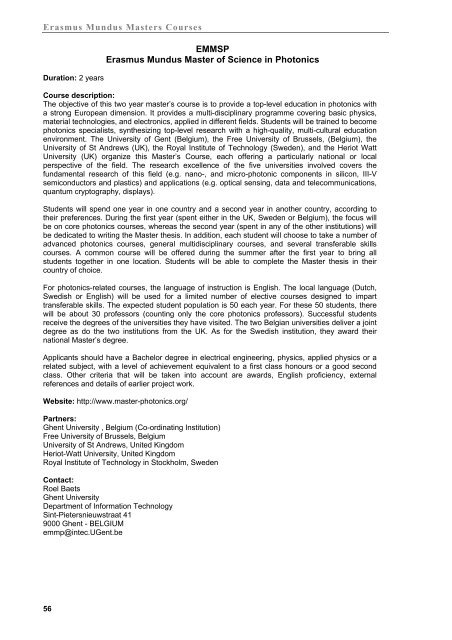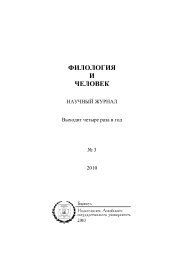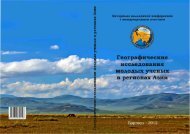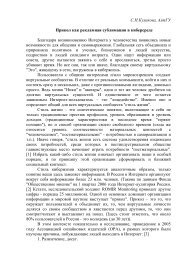Erasmus Mundus Action 1 Compendium 2009 - EACEA - Europa
Erasmus Mundus Action 1 Compendium 2009 - EACEA - Europa
Erasmus Mundus Action 1 Compendium 2009 - EACEA - Europa
Create successful ePaper yourself
Turn your PDF publications into a flip-book with our unique Google optimized e-Paper software.
<strong>Erasmus</strong> <strong>Mundus</strong> Masters Courses<br />
Duration: 2 years<br />
EMMSP<br />
<strong>Erasmus</strong> <strong>Mundus</strong> Master of Science in Photonics<br />
Course description:<br />
The objective of this two year master’s course is to provide a top-level education in photonics with<br />
a strong European dimension. It provides a multi-disciplinary programme covering basic physics,<br />
material technologies, and electronics, applied in different fields. Students will be trained to become<br />
photonics specialists, synthesizing top-level research with a high-quality, multi-cultural education<br />
environment. The University of Gent (Belgium), the Free University of Brussels, (Belgium), the<br />
University of St Andrews (UK), the Royal Institute of Technology (Sweden), and the Heriot Watt<br />
University (UK) organize this Master’s Course, each offering a particularly national or local<br />
perspective of the field. The research excellence of the five universities involved covers the<br />
fundamental research of this field (e.g. nano-, and micro-photonic components in silicon, III-V<br />
semiconductors and plastics) and applications (e.g. optical sensing, data and telecommunications,<br />
quantum cryptography, displays).<br />
Students will spend one year in one country and a second year in another country, according to<br />
their preferences. During the first year (spent either in the UK, Sweden or Belgium), the focus will<br />
be on core photonics courses, whereas the second year (spent in any of the other institutions) will<br />
be dedicated to writing the Master thesis. In addition, each student will choose to take a number of<br />
advanced photonics courses, general multidisciplinary courses, and several transferable skills<br />
courses. A common course will be offered during the summer after the first year to bring all<br />
students together in one location. Students will be able to complete the Master thesis in their<br />
country of choice.<br />
For photonics-related courses, the language of instruction is English. The local language (Dutch,<br />
Swedish or English) will be used for a limited number of elective courses designed to impart<br />
transferable skills. The expected student population is 50 each year. For these 50 students, there<br />
will be about 30 professors (counting only the core photonics professors). Successful students<br />
receive the degrees of the universities they have visited. The two Belgian universities deliver a joint<br />
degree as do the two institutions from the UK. As for the Swedish institution, they award their<br />
national Master’s degree.<br />
Applicants should have a Bachelor degree in electrical engineering, physics, applied physics or a<br />
related subject, with a level of achievement equivalent to a first class honours or a good second<br />
class. Other criteria that will be taken into account are awards, English proficiency, external<br />
references and details of earlier project work.<br />
Website: http://www.master-photonics.org/<br />
Partners:<br />
Ghent University , Belgium (Co-ordinating Institution)<br />
Free University of Brussels, Belgium<br />
University of St Andrews, United Kingdom<br />
Heriot-Watt University, United Kingdom<br />
Royal Institute of Technology in Stockholm, Sweden<br />
Contact:<br />
Roel Baets<br />
Ghent University<br />
Department of Information Technology<br />
Sint-Pietersnieuwstraat 41<br />
9000 Ghent - BELGIUM<br />
emmp@intec.UGent.be<br />
56






